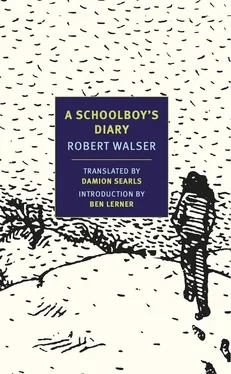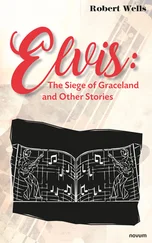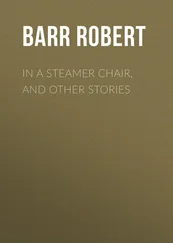Robert Walser - A Schoolboy's Diary and Other Stories
Здесь есть возможность читать онлайн «Robert Walser - A Schoolboy's Diary and Other Stories» весь текст электронной книги совершенно бесплатно (целиком полную версию без сокращений). В некоторых случаях можно слушать аудио, скачать через торрент в формате fb2 и присутствует краткое содержание. Город: New York, Год выпуска: 2013, ISBN: 2013, Издательство: NYRB Classics, Жанр: Классическая проза, на английском языке. Описание произведения, (предисловие) а так же отзывы посетителей доступны на портале библиотеки ЛибКат.
- Название:A Schoolboy's Diary and Other Stories
- Автор:
- Издательство:NYRB Classics
- Жанр:
- Год:2013
- Город:New York
- ISBN:978-1590176726
- Рейтинг книги:5 / 5. Голосов: 1
-
Избранное:Добавить в избранное
- Отзывы:
-
Ваша оценка:
- 100
- 1
- 2
- 3
- 4
- 5
A Schoolboy's Diary and Other Stories: краткое содержание, описание и аннотация
Предлагаем к чтению аннотацию, описание, краткое содержание или предисловие (зависит от того, что написал сам автор книги «A Schoolboy's Diary and Other Stories»). Если вы не нашли необходимую информацию о книге — напишите в комментариях, мы постараемся отыскать её.
A Schoolboy's Diary and Other Stories — читать онлайн бесплатно полную книгу (весь текст) целиком
Ниже представлен текст книги, разбитый по страницам. Система сохранения места последней прочитанной страницы, позволяет с удобством читать онлайн бесплатно книгу «A Schoolboy's Diary and Other Stories», без необходимости каждый раз заново искать на чём Вы остановились. Поставьте закладку, и сможете в любой момент перейти на страницу, на которой закончили чтение.
Интервал:
Закладка:
— BEN LERNER
TRANSLATOR’S NOTE
THE PROSE in this book spans most of Robert Walser’s career, from his first published story, “Greifen Lake” (1899), to “A Model Student” from the last book he published, The Rose (1925). I have drawn freely from the vast body of Walser’s still-untranslated work, loosely guided by themes of beginnings and writing (schoolboys and diaries).
The collection is bookended with two longer pieces: first, the entire title sequence from Walser’s first book, Fritz Kocher’s Essays (1904). It was a stroke of genius for Walser to launch himself at the reading public in the guise of an “impish schoolboy soliloquist,” in Christopher Middleton’s fine phrase: Fritz Kocher, a fictional fellow in an old-fashioned frame narrative, dead in his youth and leaving to posterity only a collection of schoolboy writing exercises. Fritz turned out to be the perfect vehicle for Walser’s unique energy, inventions, and oscillant ambiguities. The illustrations included here are the original drawings for the Fritz Kocher sequence by Walser’s brother, Karl, a successful artist who often collaborated with Robert.
At the other end of A Schoolboy’s Diary is “Hans,” the story Walser put at the end of probably his most thoroughly worked and carefully composed collection, Seeland ( Lake Country , published in 1920). He wrote to his publisher that he had “labored hard for a month and a half carefully going over every sentence in the book, which resulted in truly significant improvements in both form and content,” and thus requested a higher than usual, though naturally still modest, fee (“especially since I am perhaps one of the most frugal authors who has ever existed”).
The surprise ending of “Hans” raises the issue of Walser’s relationship to the political events of his time. Hermann Hesse’s praise for Walser is famous—“If he had a hundred thousand readers, the world would be a better place”—but much less well known are Hesse’s previous sentence—“If writers such as Robert Walser were among the ‘leading minds of our time,’ there would be no war”—and the fact that these comments date from the height of World War I. It was in the same year, 1917, that Walser went to work on Lake Country, moved in part by what seems to be an almost utopian impulse: as he wrote to his publisher, “The title is sensuous and simple and, I would say, pan-European or indeed global. ‘Lake Country’ can be in Switzerland [Walser was from that region] or anywhere — in Australia, in Holland, or wherever else… I consider the title appropriate in every way because it sounds as simple and unassuming as it is sensuously vivid and vitally earthy. It seems to me both objective and also colorful and charming. In short, it describes what the book is about: a region. And there is something magical in the sound of the word, ‘ Seeland .’”
In “Hans,” this dream of a common landscape comes to an abrupt end. Walser’s relationship to war and peace was complex, as is also clear in the three autobiographical pieces about his military service and the numerous other stories included here containing glimpses of schoolboy violence. He was never as innocent as his narrative personas can often seem.
He was also by no means a naïve or accidental writer, an inexhaustible scribbler for the newspapers discovered as a real writer only after his death, much less the quasi — outsider artist he is sometimes presented as. He published ten collections of short prose during his active career (along with three novels, a book of poems, and a book of short plays), and quite consciously selected and shaped these ten volumes himself, with specific intentions that differed from book to book; he often revised pieces for book publication from their earlier newspaper versions. In short, he was a professional, and whether or not he chose to collect a piece into one of his books should make a difference in how we read it. In this collection, stories dated by years without months are the ones Walser published in book form, while dates with months refer to the publication date in a journal or newspaper. Both dates are given only when the book publication was significantly later than an earlier newspaper publication (for example, “July 1899; 1914” for “Greifen Lake,” not collected in book form until 1914).
Christopher Middleton was Walser’s first translator into any language, and his two selections of Walser’s stories and translation of Walser’s schoolboy novel, Jakob von Gunten, remain in print. Middleton’s translations were my first, magnificent introduction to Walser’s work. Susan Bernofsky has translated Walser’s other three novels and four volumes of Walser’s stories, and many other fine translators have published Walser translations in periodicals and small-press books, or in Middleton’s Selected Stories . Almost all the pieces in A Schoolboy’s Diary are previously untranslated, but the four Fritz Kocher essays translated by Bernofsky—“Autumn,” “Careers,” “The Fair,” and “Music”—were needed for the complete series, and are included here in new translations. For thematic reasons I also included “Greifen Lake,” “A Story,” and “The Last Prose Piece” (previously translated by Bernofsky, the former as “Lake Greifen”), “The Rowboat” (previously translated by Tom Whalen, as “The Boat”), and “All Right Then” (previously translated by Mark Harman, as “Well Then”). I am adding my translations to the work of this distinguished company in the hope of further enriching English-language readers’ sense of Walser’s remarkable range and voice. If Walser had a hundred thousand translators, the world would be a better place.
— DAMION SEARLS
A SCHOOLBOY'S DIARY AND OTHER STORIES
PART I. FRITZ KOCHER’S ESSAYS
“Fritz Kocher’s Essays — Relayed by Robert Walser”
INTRODUCTION

Интервал:
Закладка:
Похожие книги на «A Schoolboy's Diary and Other Stories»
Представляем Вашему вниманию похожие книги на «A Schoolboy's Diary and Other Stories» списком для выбора. Мы отобрали схожую по названию и смыслу литературу в надежде предоставить читателям больше вариантов отыскать новые, интересные, ещё непрочитанные произведения.
Обсуждение, отзывы о книге «A Schoolboy's Diary and Other Stories» и просто собственные мнения читателей. Оставьте ваши комментарии, напишите, что Вы думаете о произведении, его смысле или главных героях. Укажите что конкретно понравилось, а что нет, и почему Вы так считаете.











